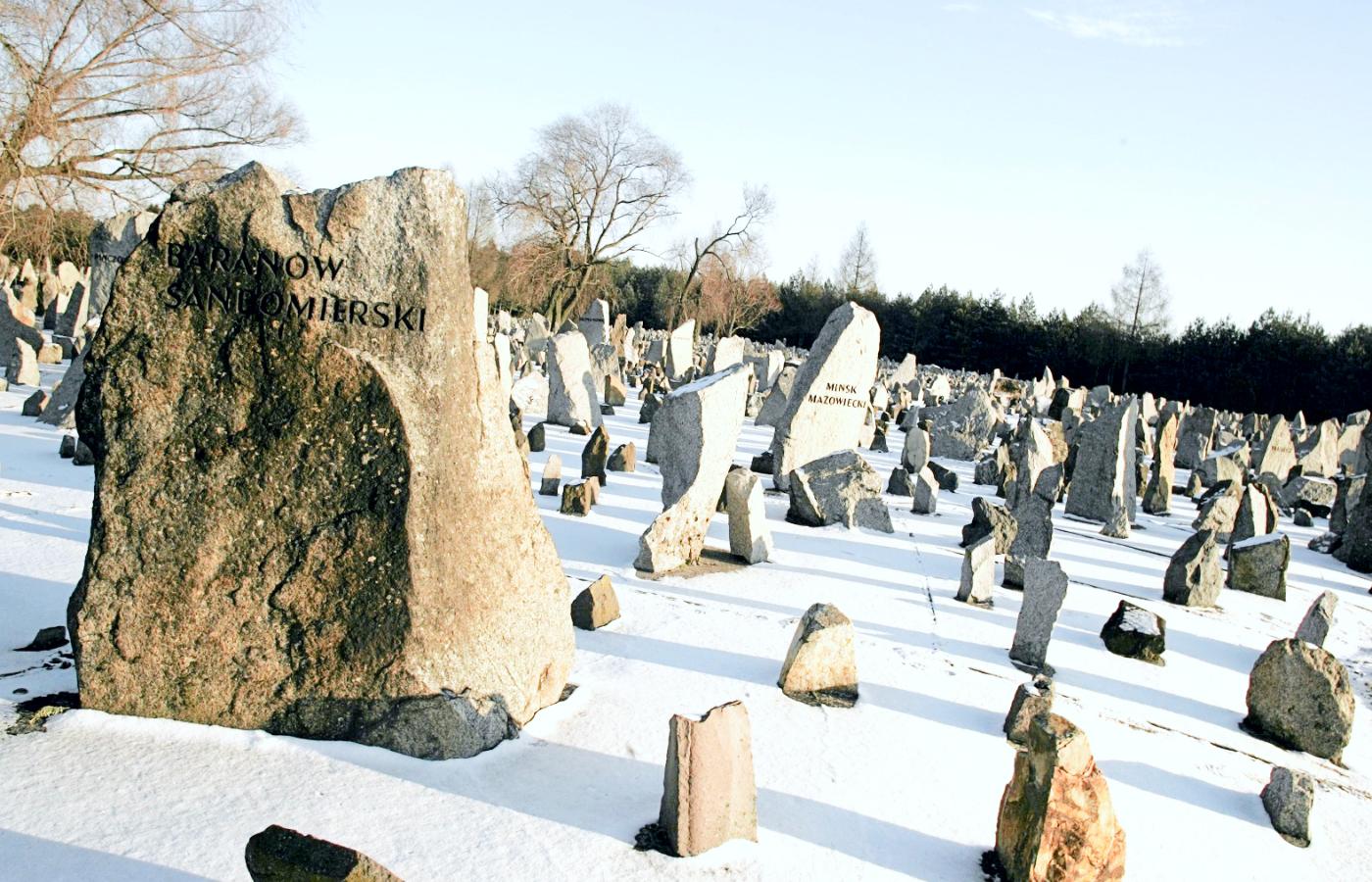 Poniżanie przez prawdę. Antysemicki skandal w Treblince
Poniżanie przez prawdę. Antysemicki skandal w Treblince
Jan Hartman

Upamiętnienie Jana Maletki na stacji w Treblince, bez podania kontekstu, oznacza manipulację w jej najprymitywniejszej formie. Wprowadzanie ludzi w błąd poprzez ujawnianie tylko jakiejś części prawdy.
Po wstrząsających ekscesach antysemickich w Polsce i próbach kneblowania ust badaczom opisującym stosunki polsko-żydowskie mamy kolejny skandal, który poruszył żydowską opinię publiczną (również za granicą). Tym razem jest to skandal, którego sens bardzo trudno wyjaśnić przeciętnemu Polakowi, bo ten, jeśli nawet nie dowierza propagandzie mówiącej o masowym pomaganiu Żydom przez ich katolickich współobywateli, to mimo wszystko jest przekonany, że ratowania było więcej niż krzywdzenia.
Jan Maletka. Kim naprawdę był?
Dlatego w bezsilnej złości patrzymy na wystawiony przez pisowski Instytut Pileckiego pomnik (kamień i tablicę) Jana Maletki, młodego kolejarza zastrzelonego w sierpniu 1942 r. przez Niemców za dostarczanie wody umierającym z pragnienia więźniom, stłoczonym w wagonach. Upamiętnienie stało się częścią aranżacji stworzonej w miejscu dawnej stacji kolejowej Treblinka, dokąd zwożono Żydów, aby zamordować ich w pobliskim obozie zagłady.
Zakładam, że sprawa młodego Jana Maletki jest dobrze udokumentowana i niósł on, wraz z kolegą, wodę, aby ją ofiarować, a nie sprzedać spragnionym za złote pierścionki. Jeśli tak, to jest bohaterem i zasługuje na naszą pamięć jako Sprawiedliwy. I doprawdy nikt nie może się równać z nami, Żydami, w czci i pamięci dla takich osób, a ciągłe insynuacje, jakobyśmy ich lekceważyli, przypominając o zbrodniach dokonywanych na Żydach przez polskich współobywateli, należą do najbardziej przewrotnych objawów antysemityzmu, podobnie zresztą jak wykorzystywanie Sprawiedliwych do umniejszania bądź nawet negowania zbrodni popełnianych przez Polaków. Wprawdzie badacze Holokaustu doskonale wiedzą, jak cudownie mnożą się lokalne legendy o rodzicach i dziadkach, którzy „rzucali cebule” w zakratowane okienka wagonów, za to dziwna amnezja przesłania grabieże i mordy, to jednak przyjmuję, że świadectwo o Maletce jest wiarygodne.
Janowi Maletce należy się upamiętnienie, i to może piękniejsze niż to w Treblince. Ale nie tam, nie w miejscu, w którym – uwaga! – Polacy sprzedawali Żydom wodę za złoto, często płacąc za swą chciwość życiem, zabijani przez niemieckich i ukraińskich strażników. Nie trzeba o tym pisać na tablicy, lecz informacja o Janie Maletce będzie dla odwiedzających to miejsce jasną a kłamliwą (świadomie kłamliwą) sugestią: tu również Polacy raczej pomagali Żydom, niż ich krzywdzili. A to nieprawda! Właśnie dlatego tacy jak Maletka byli bohaterami, że działali we wrogim Żydom środowisku i narażali się nie tylko na śmierć z rąk niemieckich, lecz w pierwszym rzędzie na przemoc ze strony Polaków i wydanie w ręce Niemców.
W sprawie wydali oświadczenie przedstawiciele loży żydowskiej B′nai B′rith. Andrzej Friedman i Sergiusz Kowalski piszą: „Polska polityka historyczna sięgnęła granic obrzydliwości. Tym razem w wykonaniu wiceministry kultury Magdaleny Gawin, która odsłoniła w Treblince – uwaga, w Treblince! – pomnik Polaków ratujących Żydów. Magdalenie Gawin, jej szefowi Piotrowi Glińskiemu oraz nadszefowi obojga pragniemy przypomnieć, że w obozie zagłady w Treblince zagazowano nas ok. 900 tys., a udział Polaków na rampie polegał głównie na sprzedawaniu wody za dolary, złoto i brylanty”. I dodają: „Zanim Polska zacznie stawiać pomniki dla Polaków na cmentarzach żydowskich, musi sobie przypomnieć o Żydach zamordowanych przy udziale Polaków. Byli, oczywiście, Polacy sprawiedliwi wśród narodów, którzy zapłacili życiem za pomoc Żydom. Zasługują na wieczną pamięć i uznanie za odwagę i piękny czyn – ale nie na tamtej rampie! (…) Jak nisko upadły polskie władze w swej nędznej próbie zaspokojenia apetytów wyborców pragnących uwierzyć w tę heroiczną fantazję. Część naszych przyjaciół i krewnych przeżyła Auschwitz. Nikt nie przeżył Treblinki”.
Instytut Pileckiego to nie „polskie Yad Vashem”
Upamiętnienie Maletki na stacji w Treblince, bez podania kontekstu, czyli pełniejszej informacji o tym, co tam się działo, oznacza manipulację w jej najprymitywniejszej formie: wprowadzanie ludzi w błąd poprzez ujawnianie tylko jakiejś części prawdy. Taka prawda cząstkowa, przesłaniająca inne części rzeczywistości, jest jedną z form kłamstwa. Maletka i tysiące takich jak on bezinteresownie pomagających to nie byli typowi Polacy – byli nader nietypowi! Znacznie więcej było takich, którzy pomagali za pieniądze (w czym nie ma nic złego), dla pieniędzy (to już gorzej) lub obrabowując ich przy tym ze wszystkiego, co mieli.
art. rekomendował : Leon Rozenbaum

Jeszcze więcej było takich, którzy Żydów wyłącznie krzywdzili (zabijali, gwałcili, wydawali, rabowali, szantażowali) bądź tylko im złorzeczyli i ich przepędzali. Jednak większość stanowili ci, których los Żydów po prostu nie interesował, bo mieli swoje zmartwienia (o co nie miałbym do nikogo pretensji). Jeśli Instytut Pileckiego nie jest w stanie unieść tych prostych prawd, za to chce je ukrywać bądź negować, to jest tylko instytucją zakamuflowanej antysemickiej propagandy, a nie żadnym „polskim Yad Vashem”.
W nieszczęsnej uroczystości ku czci Jana Maletki, która miała miejsce w Treblince 25 listopada, brali udział ksiądz i pastor. Temu się nie dziwię. Jednak był tam również rabin. Nie wiem nic o nim. Mam nadzieję, że umie znaleźć Polskę na mapie i wie, na jakim świecie żyje. Nie pierwszy to raz, gdy nieświadomi, a jednocześnie może zbyt dumni, aby zapytać o radę, rabini biorą udział w bardzo dwuznacznych uroczystościach. Rabina widziano nawet u Tadeusza Rydzyka w Toruniu. To bardzo smutne, że w wielu przypadkach polscy Żydzi doznają zawodu ze strony swoich ziomków z innych krajów. Jedni wdzięczą się do antysemitów (żeby ich jakoś obłaskawić?), a inni obrażają się na nas, polskich Żydów, gdy próbujemy tłumaczyć, że Polska nie jest „krajem antysemitów”. Niełatwo być Żydem, a w Polsce chyba nieco trudniej niż na Zachodzie.
Treblinka. Ile to Katyniów?
Ilu Polaków wie, gdzie znajduje się grób największej liczby ich współobywateli? Pewnie większość wskaże Auschwitz, a może Katyń… Pomylą się. To miejsce to właśnie Treblinka. W obozach Auschwitz-Birkenau zginęło więcej osób niż w obozie zagłady w zagubionej gdzieś w połowie drogi między Warszawą i Białymstokiem Treblince, lecz w przypadku śląskiego obozu, znanego w całym świecie, byli to głównie cudzoziemcy. W Treblince umierali swoi. Swoi? W komorach gazowych tego anus mundi zakończyło życie ok. 850 tys. ludzi, w tym ok. 800 tys. obywateli polskich, a m.in. ćwierć miliona mieszkańców Warszawy. Czy to „swoi”? Ile to Katyniów? Jakże nieproporcjonalna jest pamięć.
Teren obozu w Treblince jest dziś przepięknie zagospodarowany, choć najczęściej jest tam pusto – nie znajduje się na szlakach polskiej martyrologii, nie przywozi się tam masowo młodzieży, choćby z warszawskich szkół. Miejsce – dziś straszne i piękne – pozostaje ciche i ustronne. Nie ma tam nawet muzeum z prawdziwego zdarzenia, a jedynie skromna izba pamięci. Powód jest jeden – dla współczesnych Polaków ofiarami Treblinki nie byli Polacy, a w każdym razie nie Polacy pełnoprawni, lecz obcy – Żydzi w Polsce zamieszkujący. To zasadnicza różnica.
Antysemicka słoma wyłazi z butów
Z polskiego punktu widzenia Holokaust to swego rodzaju „konkurencja”, męczeństwo nie swoje, nie polskie, za to przesłaniające w oczach świata to, czego doświadczyli etniczni Polacy. Długo by mówić, dlaczego nie jest to tylko małostkowe i podszyte resentymentem myślenie, lecz również myślenie całkowicie niezgodne z prawdą. Pamięć Holokaustu pomaga, a nie przeszkadza, krzewić wiedzę o okupowanej Polsce. No chyba, że ta Polska za wszelką cenę chce się wybielać – wtedy, rzecz jasna, faktycznie może przeszkadzać.
Nieszczęście antysemitów polega na tym, że czym bardziej zapewniają, że nie są antysemitami, tym bardziej grzęzną w antysemickim dyskursie, który zawsze zaczyna się od „ale”: ale Żydzi sami są winni temu, że nikt ich nie lubi; ale Żydzi chcą, żeby pamiętano tylko o nich; ale Żydzi wszędzie widzą antysemityzm. Takie instytucje jak Instytut Pileckiego są typowym przykładem tego kompleksu. Czym bardziej są „wcale nie antysemickie”, tym bardziej antysemicka słoma wyłazi im z butów.

Zawartość publikowanych artykułów i materiałów nie reprezentuje poglądów ani opinii Reunion’68,
ani też webmastera Blogu Reunion’68, chyba ze jest to wyraźnie zaznaczone.
Twoje uwagi, linki, własne artykuły lub wiadomości prześlij na adres:
webmaster@reunion68.com



